|
My favorite joke -- Violet found it in a book -- goes like this: Knock, knock Who's there? Control freak. Now, you say, "control freak who?" *** This post is an unwieldy thing. My thoughts are all over the place, and even though I know it's all related somehow, I can't seem to tie things together, get a grip on a cohesive whole. It's like knitting a sweater that unravels in my hands even as my needles click along. I've had to just let go and write, try to release my notions of neatness, completeness. *** 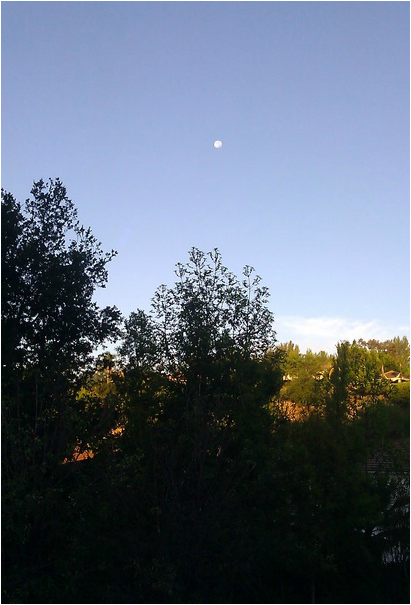 Sunrise with moon, Topanga Sunrise with moon, Topanga Saturday: This morning, Eric and the kids left Topanga. They're driving up north to visit his family. I'll join them in a few days, but for now, I'm on my own in the canyon. Where have two and half weeks gone? As they packed up, loaded the car, took a last dip in the pool, bid the doggies goodbye, a heaviness settled over me. I miss them, achingly, already. And, too, their departure forces me to face the fact that my own prized time here is winding down. When Eric first told me his plan to leave early, I resisted. I clung to the idea of a full three weeks in Topanga together, not just as a timeframe, but as a concept, part and parcel of my SUMMER | unscripted project: fully present with my work and fully present with my family. To cut it even a little bit short felt foolish, wasteful, like cheating the kids, squandering a perfect gift. But there's a family reunion up there that he doesn't want to miss, and I have the dogs to care for here and work to do, so I can't leave yet. And whether or not this was part of the reasoning behind it, it was an act of generosity on his part, toward me and my writing. I had to let them go, and graciously. *** The first time I ever heard the term control freak was in reference to me. I'm a freshman in college. A senior guy is paying some attention to me. I don't know him very well; I've been cast in a scene for his first semester final in Directing class, Who's afraid of Virginia Woolf? He seems nice enough; he's attractive, with scrunchy eyes, bushy brows and thick brown hair that sticks up in tufts. He's kind of a sweaty sort, self-consciously earnest and sensitive, perhaps cultivating the tortured soul vibe. If asked to describe himself in one word, he might choose intense, or maybe even iconoclast. I can tell he thinks he has a lot to teach me, just a shit-ton of 22-year old wisdom about things like Life, The Theatre, and Edward Albee to impart. We work through the scene a few times and he wraps up rehearsal for the day. The guy playing "George" leaves. I sit down on a bench and look over my script, eager to impress, to please, with my assiduous good student-actor overtime. The student-director sits down behind me, straddling the bench, and pulls me close so that I'm leaning back almost against him; he begins massaging my shoulders in an exaggeratedly supportive gesture. His touch is warm and maybe just slightly skeevy, very firm, to show me he knows what he's doing. "Feel that?" he asks. "Uh, yeah," I wince. He's digging really hard, but I don't want him to think I can't take it, can't match his intensity. "That's a biiiig knot right there." He makes small talk while kneading my left trapezius, first with his thumb, then his elbow, asking me about my classes, my roommate, where I'm from. He compliments my outfit, tells me I'm "a very mature actress for a freshman." "Not a lot of 19-year old women can play 'Martha,'" he continues. Now, to be sure, no 19-year old has any business playing 'Martha,' and deep down I suspect this, even in the moment, but all I can think is, Oh my gosh, that's the first time anyone ever called me a woman. "Thanks," I say, trying to be cool about it, thinking I must be awfully good in the scene. I can hear the wry smile in his voice. "It's because you're such a control freak." I instantly register that this is not a compliment, certainly not in artistic circles; it doesn't sound very actressy. Aren't I supposed to be a free spirit, someone who can let it all hang gloriously out? Control freak sounds like a tax attorney. I feel my shoulders springing up toward my ears, but I laugh to let him know he doesn't get to me, "Oh, really?" He wedges the heel of his hand against a tense spot along my thoracic spine and makes little niggling circles, speaks in an irritatingly gentle voice, "You don't have to get defensive." Defensive? Who's defensive? "It's ok," he says, "I'm a control freak too." This has a vaguely lascivious undertone, intended, I gather, to suggest that in all his maturity, he has learned how to channel this natural proclivity not only into good art but also good sex. *** I left Eric and the kids at an Avis rental place on Ventura Blvd. at 10 a.m. and turned toward home to start working. I'm breathless, my heart is riding suffocatingly high in my chest with the sense of my own aloneness, the yawning span of usable time before me. Also I feel inexplicably hungry, ravenous. I'm thrilled and grateful for the time to myself, but it feels, paradoxically, way too big and empty, and way too short. Because now I really have to produce something. It's only three days. I can hardly be expected to turn out The Brothers Karamazov. But suddenly the freedom feels like a kind of pressure. I have a lot of things I want to squeeze into three days of solitude: Write, at length, daily Run canyon trails Run on beach Explore the little village of Topanga Study the geological and anthropological history of Topanga Spend time at Point Dume, looking for signs and wonders Spend hours writing at favorite cafe in Venice Swim in pool under the stars, while contemplating meaning of existence, or at least of this project Swim in ocean, while contemplating ways to become full time beach bum One brief social engagement (preplanned; still a maybe) But first, I thought I ought to do these things: Stop in Target; buy mascara, toilet paper, 2 new swimsuits for Hutch so he can choose, gum, Liquid Plumber Stop at Ralphs, Trader Joes, and Sprouts to grocery shop for a few items I need to replenish for hosts Start a load of laundry Skim pool Make decadent dirty vodka martini with gorgonzola-stuffed olives bought at Sprouts; drink it at laptop Take nap at laptop Take shower Change laundry Eat chocolate Stalk the control freak guy on FB, see what he's up to these days I've literally done everything I can think of to avoid doing the one thing I should be doing, which of course, is writing. This futile and counterproductive self-soothing process is interspersed with excruciating spells at the desk, actually writing, or trying to, until approximately 6 pm, when, neck stiff, ankles swollen, very little of any value on the page yet, and all hope generally lost, I decide I must repair to the beach to run and swim. Damn, one day gone and now I just feel truly panicked. I can't seem to get settled, to bring anything into focus. Nothing I'm thinking, writing, feeling makes any sense. I can't get control of the moment or the story. *** Sunday: Unscripted alone time, as any parent of young kids (without full-time help) will tell you, is very hard to come by, a precious commodity. The need to go off on my own and write in total privacy, to find a rhythm not dictated by three square meals, the school day, errands, bedtimes, sometimes makes me quite desperate. It's the impetus behind the retreat (two, if possible) I take each year. I blissfully write for 8, 10, 12 hours at a stretch for a week or so. I plan my away days in strict detail; I'll bang out five hours of writing on the airplane getting to the retreat. Normal, day-to-day discipline is vital, of course, but even when I'm actually disciplined, which isn't always, I've found I can take a project only so far on that; then I really require a period of isolation to let everything else go and just disappear into the work at hand. If I can't carve out that time, I get a little crazy, a little despondent, the project loses steam and appeal. There's a cyclical endlessness to homemaking, (even those aspects that I genuinely love), and when it comes between me and the creative work I'm for some reason compelled to do, I either give up or get extendedly pissed off. It's always the writing that goes out the window, not the vacuuming. And it's not just about what the house looks like, it's what the inside of my head looks like when my home is in chaos. When I sit down to work, the first thing I do is dust my desk. There you have it. If I really allow myself to get lost in the work, I'm irritable when I'm interrupted, impatient with the children, snappish at Eric. Sometimes my hands actually shake. Or, if I keep up with all that needs to be done at home, I shortchange my work by never really digging in, which means I never finish anything, and that makes me frustrated and resentful, impatient with the children, and snappish at Eric. A decade into motherhood, I've not yet mastered the art of switching gears quickly, making the most of short snatches of time. I feel terrible when I'm not truly present for my sweet kids, and know I will regret it; and I feel terrible if I'm not producing anything worthwhile creatively, and know I will regret it. I hold it all rather tightly. *** I haven't written much under the SUMMER | unscripted subheading of Ocean Days, but we've spent a lot of afternoons at various beaches, after I've finished my canyon encounter and subsequent writing for the day. Maybe, subconsciously, the Canyon Days writing feels like the real work, while the Ocean Days writing, which in a sense reflects our playtime, doesn't seem legit, though I always intended it to be a significant part. The reality, as any kind of artist, is that you’re never off the clock, never feel like you can take a vacation -- partly because your passion for work drives you and you see everything though that lens, partly because you don't want to miss any opportunity that might be important (a submission deadline, an audition)… and partly because you secretly worry that everyone thinks you're perpetually on vacation. (Defensive? Who's defensive?) *** The Pacific ocean draws me toward it, like an irresistible psychic low tide with all the gravitational force of the full, shining moon. I can feel it from way up here on the mountain; it tugged at me constantly when we lived in the San Fernando Valley; and clear across the country, at my desk in New York City, it laps at my consciousness, leaves a wet, salty film that clouds my existence there. Our whole family, to some degree -- perhaps Hutch and I most of all -- feel like the Southern California coast is our natural habitat. This is as powerful as it is inexplicable; I was born in Buffalo, for pete's sake. Sometimes it feels like our unaccountably good life in New York City -- ties strong and real, both emotional and practical -- is, in a way, the velvet handcuffs. *** Hutch and I are the early risers in the family. I get up and make coffee, do my morning pages, spend a half hour alone, quiet before the morning madness begins. When he comes up to join me, he tells me how long he's been awake... Since 6. Since 5:30. Or all night, never slept a wink. (uh-huh). "Well, what have you been doing all this time?" I ask. The answer is always the same. "Telling myself a story." *** Venice Beach is sprawling and flat, the slope out to sea long and shallow. Big combers crest some 50 yards offshore and come rolling in slowly to tumble you in a salty milkshake of soft froth. It's a young boogie boarder's dream. Hutch wants to be in the water every minute. He can entertain himself for hours, but much prefers to have the whole family in all at once. He and I swim together a lot, having body surfing contests and laughing our heads off when one of us face plants. We happily suffer skinned knees and swimmer's ear for the visceral and spiritual pleasure of pure abandonment to the water. You do have to be careful. Rip tides crop up quickly in unexpected places and if you go in too far you can find yourself suddenly in a whorl of crisscrossing currents, paddling away and going nowhere. Hutch had that experience once last week. He was never in real danger; it wasn't deep, the pull lasted only few seconds, and Eric was right there with him, but for a moment he had that feeling of helplessness, loss of control. He got over the scare quickly, lesson learned, and described the experience to me in excruciating detail. Twice. Now, each time we catch a wave and pop up out of the bubbling surf, he says, “So, mom, that one…” and then proceeds to illuminate the finer points of his interaction with that particular breaker. *** Usually, by the time I take a writing retreat -- once every six months at most, and this last time, a whole year got away in between -- things have reached a kind of critical mass. I simply cannot wait a second longer. But this time feels different. I'd found a rhythm here, with the family hanging around. If I sometimes I found myself fighting to finish an essay, and the kids were impatient, and I shooed them away, put them off, scolded them -- well, they know that the writing is why we're here; it's why they have the pool and the yard now, and the ocean later. That was the plan, the control in the experiment, the script in unscripted. It was almost as if having that inertia, the pushback, was giving my daily writing necessary, productive urgency. Then off they went, of their own volition, and left me without a prefab frame for my day, without a new idea burning a hole in my notebook, and all alone to do the slow letting go of Topanga. I'm surprised what a hard time I'm having getting my bearings, how adrift I feel in the circumstances... and in the day's (days') writing... which, it turns out, is about that very issue. Family. Can't work with 'em, can't work without 'em. Sometimes I think about the time before I had kids. I know I felt very busy, but I literally cannot remember what I was doing. Why didn't I write my Brother's Karamazov while I had the chance? Maybe the reason I feel like I'm not getting anywhere a lot of the time is that I wait for the muse to speak to make a real start. Maybe I haven't really disciplined myself to work with or without a plan. Maybe it's all well and good when the canyon feels chatty, but I don't really know how to dive headlong into uncharted waters-- unstructured free time, an unplanned essay, a genuine improvisation -- and just keep treading till the lifeboat arrives. Perhaps I need to consider whether the obstacles -- and their doppelgänger, artistic agoraphobia -- aren't about my family at all, but are within me. *** At some point in college, I had to take one of those quasi Myers Briggs tests designed to tell you something profound about yourself. This one, apparently, was some psychometric meant to help me choose a major and commensurate Life's Work. I labored over the obscure and seemingly unrelated questions, answering as honestly as I could, though probably with an eye toward a certain desired result -- thinking it would probably return career suggestions falling somewhere on the artistic spectrum between Bohemian Goddess and Poet Laureate. Or simply and clearly, Sarah Bernhardt. When the points were tallied, the verdict in, you know what my best career match was? Air Traffic Controller. The point is, it's damn hard work for me to be a free spirit. *** 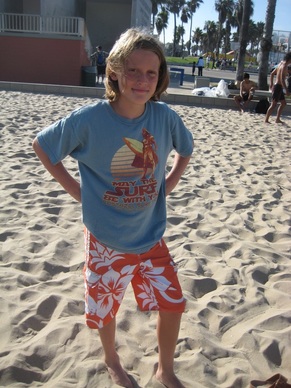 Point Dume, in Malibu, is my favorite beach. I have a weird kismet with the place -- even as I find the idea absurd, magical things seem to happen to me there, signs and wonders I find hard to ignore. (Read the Button Jar and the Green Shoes) Plus, there are often dolphins, sea lions, even whales remarkably close to shore. The sunsets are astonishing. The surf is a little rough, though. The beach banks sharply toward the water, and the waves crest just before they hit the sand in a cloud of gravelly foam. They're at full force only a few feet offshore. If you wade in just shin deep, the powerful surges come and crash over you; they can knock you down if you're not prepared. And the undertow right there is strong; it grabs at your legs and if your feet are planted in the sand, the force of the pull can hurt your knees. It's intimidating water. When I'm there with the kids, I can't really relax. I'm helicoptering the whole time. *** Despite the lushy sound of a gorgonzola olive martini alone at noon on Saturday, I'm not much of a drinker. I don't like the feel of slurred words on my tongue, the room swaying, or that sense that my brain is encased in feathers. I'm clumsy enough without adding inebriation; I've spent half my life just trying to figure how to stay vertical and not fall over randomly, which I still do pretty frequently. That’s one of the reasons I love yoga -- its the only area in my life where I have achieved a measure of success in balancing. I like to feel in possession of my faculties. Relaxing, to me, letting go, is a grueling yoga workout, followed by a good sweaty melt in savasana. *** To be a "freak" about anything, including control, has such unpleasant connotations. I prefer to think of myself as attentive to detail, or as having a strong sense of coherent narrative. If I tend to hold on a bit tightly, well, that's just an occupational hazard for someone compelled to make stuff she feels passionate about, safely raise two decent children, and, you know, keep the planet on its axis. *** Monday: A few days after the Sandy Hook Elementary School massacre, a parent at school -- I honestly can't even remember who it was anymore -- came up to talk to me. She spoke in a low tone. "I just thought you'd want to know," she said, "that your son is... telling stories about the shooting." Her words were gentle, but there was a detectable undercurrent of reproach in her voice. "Of course it's all very confusing for them, but apparently he's telling other kids that he knows someone that was there and saw the whole thing." She gave more detail, recoiling. "You might want to talk to him." I didn't know what to do. In the moment, I was mortified. The implication was that my 8-year old was sensationalizing, getting a perverse thrill somehow out of exaggerating his knowledge of and connection to an incomprehensible tragedy. And, by proxy, that I, as a parent, had perhaps not dealt with the situation appropriately. But I know my kid, his almost worrisome sensitivity, his emotional intelligence; I knew instinctively that he wasn't doing something gratuitous. I wanted to understand, and I knew I had to tread very gingerly. The fact is, we have family in Newtown. Hutch's "twin" cousin (7 days apart, almost to the hour), attends the elementary school across town, and was on lockdown for hours, so sickeningly close, and yet, not there. I realized that for Hutch, struggling to digest not only the facts, the horror of what had happened, but the disturbingly few degrees of separation, telling a story was a way of trying to gain some infinitesimal measure of power over a darkness that, he suddenly saw, might otherwise engulf him. What I understood then is that sometimes storytelling, even erroneous, even exaggerated, is our only handle on something too huge to hold. Didn't we all cling to -- tell and retell -- the story of the person -- "my coworker knows someone who knows..." a woman? a man? a survivor -- who, on 9/11, as the tower collapsed -- was it the north? the south? -- surfed a wave of rubble to safety dozens of stories below. It was, I believe, 11 years before a version of that story was corroborated by a structural engineer who worked in the towers and had actually fallen, softly enough to live, twenty stories in some sort of miraculous updraft of air and debris. For most of us, most of what we deal with in life is nothing like the immeasurable sorrow and loss, the bottomless letting go that those Newtown and World Trade Center families faced -- a chasm beyond the reach of art. But when we're the ones on the fringes of those cataclysmic events -- or just, day to day, simply left breathless, speechless by the enormity of life's possibility and peril -- if we can find a way to shape the narrative, we feel we can manage it a little. If I'm an author in some way, I'm not just a character in a story with an unreliable, capricious, sadistic -- or even benevolent -- narrator. To be able to say that someone -- yourself or your acquaintance -- came thisclose to catastrophe or splendor and somehow made it though, "lived to tell the tale," means there is hope, there is order, there is something to hold onto. You can break off a little piece of the vast canyon and squeeze it in your hand. Stories are touchstones. It's the common thread of myth, religion, art -- to reach for a way to translate that which is transcendent, in good ways or bad, into something we can, literally, handle - a book, a painting, a relic. If we can tell a story about something, we have some kind of control, however illusory, over it. Which of course is what it is -- illusion. We have no control. The unfathomable abyss always surrounds us on all sides. But so does inexhaustible mystery and magnificence. Sometimes we know we have had a brush with one or the other. Sometimes, as with the great ocean, they're one and the same. *** A year ago right now, I was on plane back to New York, with the kids, after a month in Topanga. We'd been apart from Eric the whole time and couldn't wait to get back to him. At the same time, I remember how my heart was lurching that morning. Knowing my much wished-for month in the canyon and ocean, my near-perfect summer set-up for side-by-side work and family life, my big creative plan, was over, I couldn't get out fast enough. Run away, run away before the tide pulls you under and you cannot return to city life. But that's part of the project too - to do this piece of it, give over to it fully and then say goodbye, close the chapter, let it go. Time - and not just clock or calendar time - but this particular shrine of time that was circumscribed to be about the work, the canyon, the ocean, the things I cannot get a handle on; the time to tell a story that hopefully somehow holds together, holds me together, makes sense of what in heaven's name I'm trying to do with my life -- 21 days -- is drawing to a close. *** Last summer, the first time I did this trip, I sat on the patio with my good friend Genevieve and told her about my high (unrealistic) aspirations for the time -- the need that I felt to justify it, to make it meaningful in some artistic and career sense, how I'd undertaken a ridiculous number of random creative projects, from writing to cooking to making a daily bouquet from the rose garden. I said I didn't really know what it was all about. "I understand exactly what you're doing," she said, "It’s about finding the beauty in every moment." *** I think Hutch needs to tell me the story of each wave because, having come into contact with its unbridled energy and power, he has to translate it into words or be cowed. What we love best and what scares us most are always tied. Is it any wonder that Hutch is obsessed with Tsunamis? Could it happen? Will it happen? What happens when one does happen? What are those "Evacuation Route" signs down on Pacific Coast Highway? Then he explains his elaborate tsunami survival plan. *** When I'm In the ocean, without my children around, I close my eyes and swim and float. I don't pop up like a sea lion after every wave and look around, make a headcount. It's important for me to spend time in the water by myself, to let the big waves lift me and knock me down, and not talk to anyone about it. To actually go in deeper, lose control -- if I let my body do it, then perhaps my mind, heart, breath, and work will follow freely into the churning ocean of unscriptedness. *** Whether I'd be better suited or more content as an air traffic controller or tax lawyer than I am as a writer or actor is immaterial. Creative people aren't different or special or weird, they just have a certain way of processing the universe. Every storyteller, every artist -- despite their persistent cultural stereotype as freewheeling, freeloading, loosey-goosey, hippie-dippie -- is essentially a control freak, with a driving need to make something very exact because it's the only way they can confront the supernovas. *** Hutch is a storymaker if ever there was one. Sometimes he wants to tell them to me; sometimes he keeps them to himself, and I wonder what worlds are spinning in that head of his. I'm always saying, "You need to write these stories!" But he struggles hard with a blank page; I have seen how lost and overwhelmed and shut down it can make him feel if it's forced on him. Sometimes his hands actually shake. *** I'll go out to Point Dume this evening. It's a mystical time of day there. The sea color deepens, and the white caps turn pink, the cliffs glow gold in the setting sun. I'll run in the sand till I'm hot and sweaty, and then get in the ocean and let the waves work me over. I think I've got mermaid blood. I'm never afraid of the water. But for a long time, I couldn't bring myself to get in and swim at Point Dume. I'd stand at the edge and splash around, look for shells, micromanage my kids and Eric. I'd pretend I was content with that experience. It was my favorite beach, but truly, it brought out my fear, the control freak in me. But I've discovered - (well, full disclosure, Eric showed me) - that just beyond the break point of the waves, the water is calm and shallow, almost currentless, the swimming divine. You have to get past the heaving water's edge; you have to go all in. It's not for the timid, no place for those who don't want to get their hair wet and tangled, their pants full of gravel. Very tall waves begin to swell and curl just a little further out; they look scary. But if you relax and let go, lift your feet, stop resisting the wave and go with it, it will curl you into its roiling belly and give you a breathtaking thrill ride; it's not gentle, it's not neat and clean, but it will carry you all the way in, depositing you, sandy and sputtering, safely on shore.
1 Comment
|
Archives
July 2018
All text and images, except where credited, are © Jenny Sheffer Stevens and The Regular Jenny, 2015-2019 -- All rights reserved.
|
Read my recent interview in:
© COPYRIGHT 2015-2021. ALL RIGHTS RESERVED.
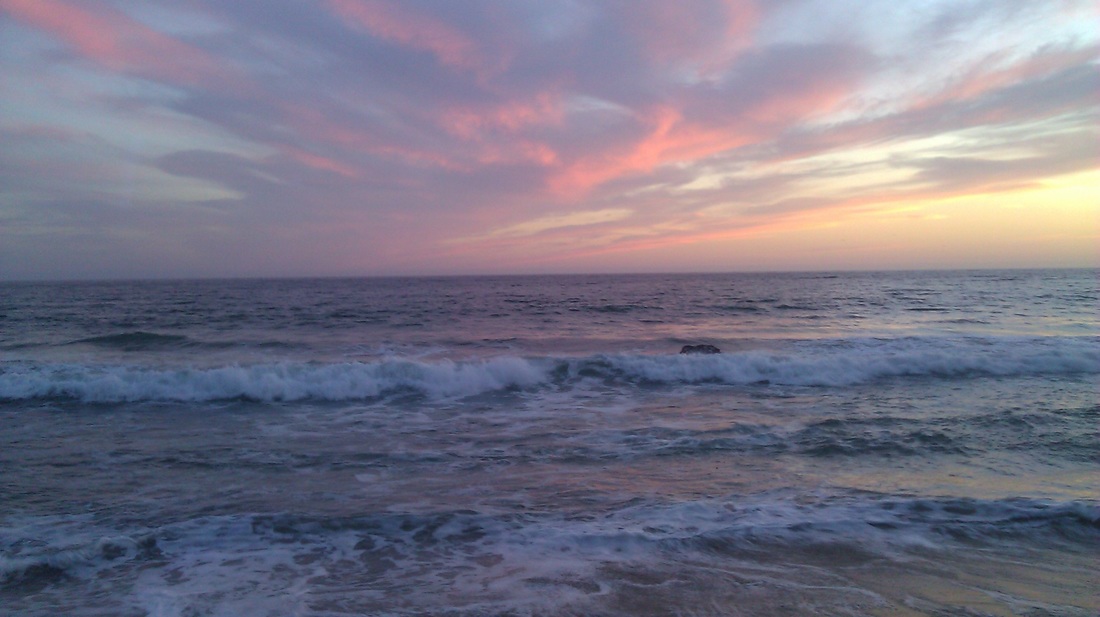
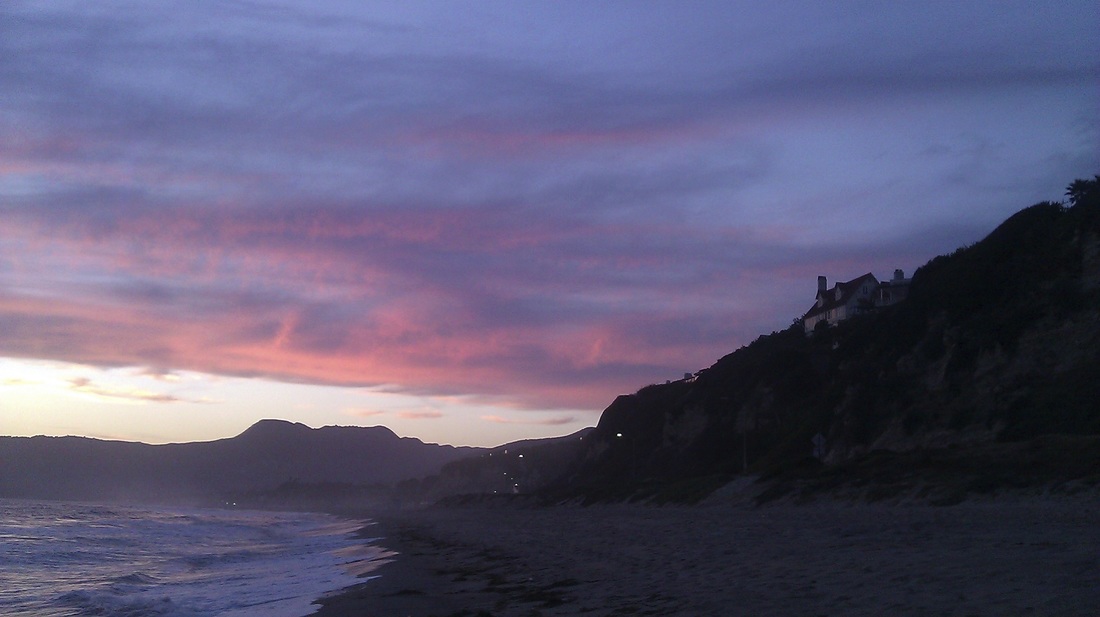
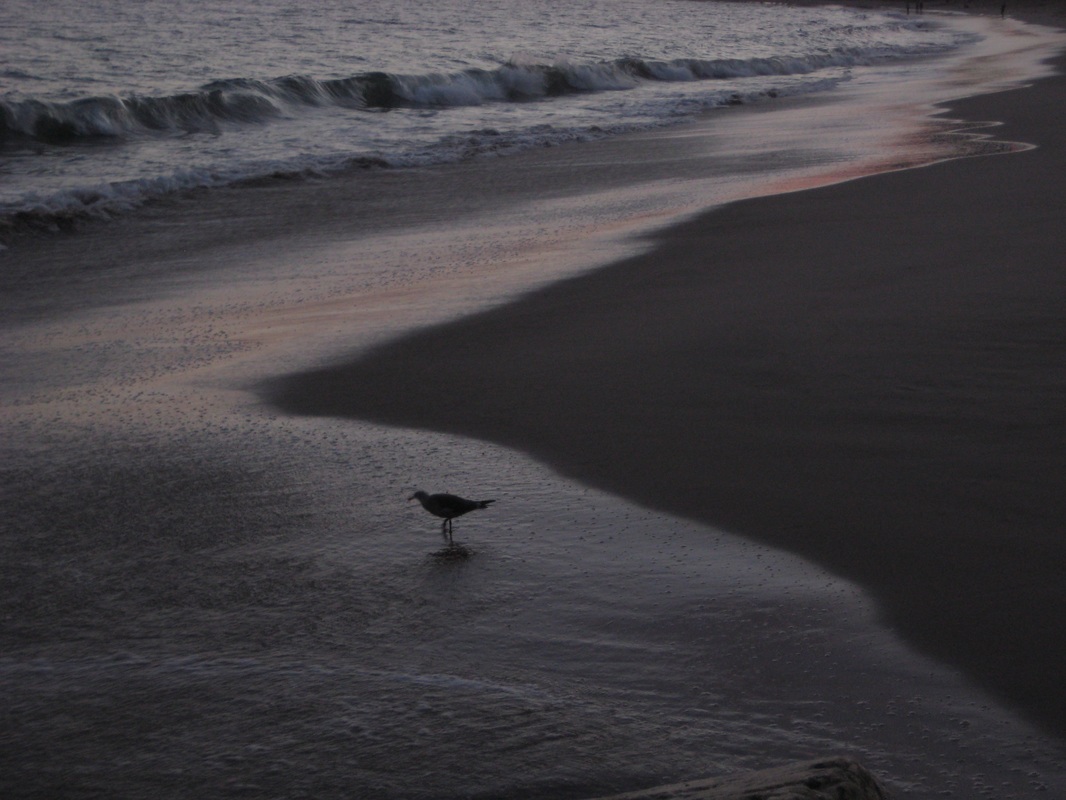
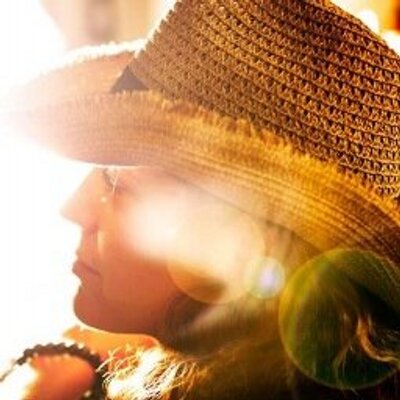
 RSS Feed
RSS Feed
